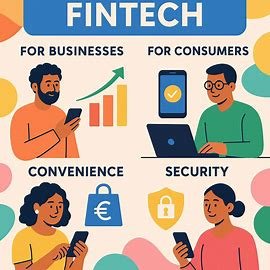Introduction
Blockchain technology is one of the most transformative innovations in the Financial Technology (FinTech) industry. Known for its role in powering cryptocurrencies, blockchain is now driving advancements in secure payments, decentralized finance (DeFi), and cross-border transactions.
In this article, we’ll explore how blockchain is changing the FinTech industry, its key applications, benefits, and future potential.
What is Blockchain in FinTech?
Blockchain is a distributed ledger technology (DLT) that records transactions securely, transparently, and immutably. In FinTech, it’s used to eliminate intermediaries, reduce costs, and ensure trust between parties.
Why Blockchain Matters in FinTech
Traditional financial systems rely on centralized institutions, which can be slow, expensive, and vulnerable to fraud. Blockchain solves these problems by offering:
- Decentralization: No single point of control
- Transparency: Immutable records accessible to authorized parties
- Security: Strong cryptographic protection against tampering
Key Ways Blockchain is Transforming FinTech
1. Secure and Transparent Transactions
Blockchain ensures that financial transactions are recorded on a tamper-proof ledger, reducing fraud and enhancing trust between parties.
Impact:
- Real-time transaction validation
- Lower risk of data manipulation
- Better auditing and compliance
2. Cross-Border Payments and Remittances
International money transfers are traditionally slow and costly. Blockchain enables instant, low-cost cross-border transactions without intermediaries.
Benefits:
- Faster settlements
- Reduced transaction fees
- Global financial inclusion
3. Smart Contracts
Smart contracts are self-executing agreements built on blockchain, which automatically execute terms when conditions are met.
Use Cases:
- Loan agreements
- Insurance claims
- Trade finance
4. Decentralized Finance (DeFi)
DeFi platforms use blockchain to provide financial services like lending, borrowing, and investing without traditional banks.
Advantages:
- Greater accessibility
- Lower costs
- Peer-to-peer financial transactions
5. Digital Identity Verification
Blockchain offers secure digital identity solutions, helping reduce identity fraud and streamline customer onboarding (KYC processes).
Impact:
- Faster verification
- Improved security
- Better customer experience
6. Asset Tokenization
Blockchain enables tokenization of real-world assets such as real estate, stocks, and commodities, allowing fractional ownership and easier trading.
Benefits:
- Increased liquidity
- Lower entry barriers
- Transparent ownership records
Benefits of Blockchain in FinTech
- Cost Reduction: Eliminates intermediaries
- Speed: Near-instant settlements
- Security: Advanced encryption
- Transparency: Immutable transaction records
Challenges of Blockchain in FinTech
- Regulatory Uncertainty: Lack of global standards
- Scalability Issues: Limited transaction speed on some networks
- Energy Consumption: High power usage in certain blockchains
- Integration Complexity: Adapting legacy systems
Future of Blockchain in FinTech
The future of FinTech is decentralized and blockchain-driven. Expect wider adoption in payments, lending, digital identity, and compliance solutions, as well as stronger integration with AI and IoT for smarter financial ecosystems.
Conclusion
Blockchain is more than a buzzword—it’s a game-changer in the FinTech industry, offering secure, transparent, and cost-effective solutions for modern finance. Businesses that embrace blockchain today will gain a competitive advantage in tomorrow’s digital economy.

Leave a Reply